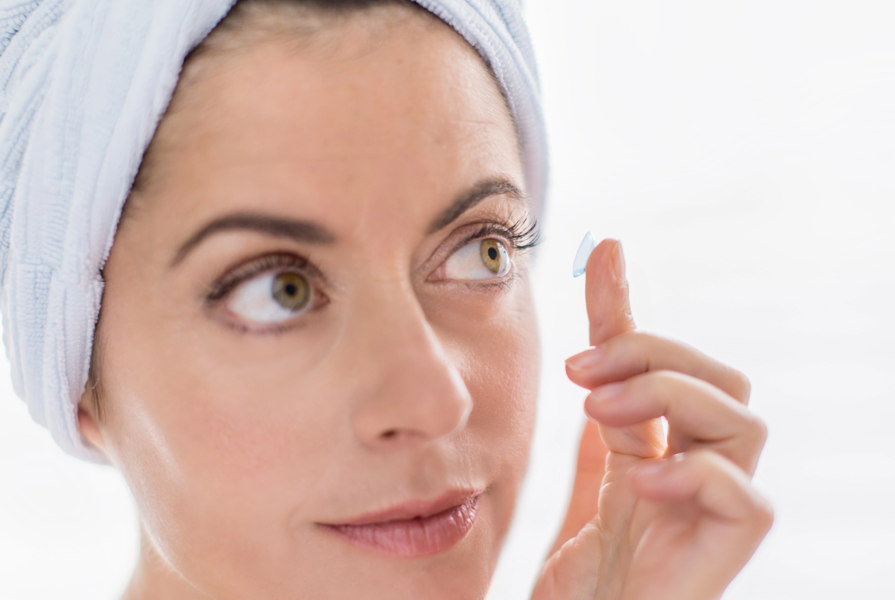Can I Wear Contact Lenses If I Have Dry Eyes?
Do dry eyes mean you have to give up on the idea of wearing contact lenses? Is there a way to wear contact lenses comfortably despite dry eye syndrome?
Not all contact lenses worsen dry eyes; some are designed to improve moisture retention and suit dry eye sufferers.
I’m Martin Robinson, the owner and principal optometrist at Martin’s Eyecare in Glenorchy, Tasmania. As someone who’s helped countless patients manage dry eye syndrome while using contact lenses, I know how frustrating it can be to balance comfort and vision clarity. But there are solutions available.
Don’t let dry eyes stop you from enjoying the benefits of contact lenses. Keep reading if you want to make informed decisions about your eye care.
KEY TAKEAWAYS
-
Silicone hydrogel lenses allow higher oxygen flow, reducing dryness and irritation.
-
Daily disposable lenses minimize deposit buildup and provide fresh comfort every day.
-
Next generation soft lenses that utilize water gradient technology can reduce discomfort, reduce the impact on a poor tear film and can even repel oil and bacteria adherence.
-
Scleral lenses are ideal for severe dry eyes, offering a tear-filled reservoir for hydration.
-
Ortho-K (orthokeratology) contact lenses only need to be worn while you sleep

Understanding Dry Eye and Contact Lenses
What happens when your eyes don’t produce enough tears or when those tears just don’t do their job? We are talking about dry eye disease; a condition that often leaves people feeling like something is stuck in their eye, or even causes blurry vision. Environmental factors like wind, air conditioning, and long hours in front of screens can worsen these symptoms.
For contact lens wearers, the challenge can become even more pronounced. Standard contact lenses can interfere with the tear film, increasing evaporation and heightening the discomfort for those with dry eyes. The friction from the lenses doesn’t help either, often making symptoms like redness, irritation, and grittiness even worse.
For many people, this discomfort can cut short the amount of time they can wear their lenses comfortably. If you’ve experienced any of these issues, it’s important to know that solutions do exist. You don’t need to abandon contact lenses completely.
Types of Contact Lenses Suitable for Dry Eyes
Which types of contact lenses are designed to make life easier for those with dry eyes? Thankfully, advancements in lens technology offer options that cater to various levels of dryness, providing comfort without sacrificing vision clarity.
Silicone Hydrogel Lenses
- Allow more oxygen to pass through to the cornea compared to traditional lenses, reducing dryness and improving comfort.
- Brands such as Total 30 and Ultra Monthlies are popular for their moisture-retaining properties.
- Total 30 lenses resist makeup deposits, making them practical for everyday use while providing clear, uninterrupted vision.
Daily Disposable Lenses
- Provide a fresh pair every day, minimising irritation by avoiding the buildup of proteins and debris.
- Water gradient lenses like Total1 offer enhanced comfort with a silky surface that reduces friction and preserves the tear film.
- Ideal for individuals seeking a low-maintenance, convenient option.
Scleral Lenses
- Designed for severe dry eyes by vaulting over the cornea to create a moisture reservoir.
- Deliver long-lasting hydration, offering relief for those with persistent dryness throughout the day.
Orthokeratology (Ortho-K) Lenses
- Worn overnight to reshape the cornea, eliminating the need for daytime lenses.
- Reduce interaction between the eyes and contact lenses during the day, alleviating dryness while providing clear vision.
The range of options means there’s a solution for almost everyone. Whether it’s high oxygen permeability, convenience, or targeted hydration, different lenses can transform the experience of wearing contacts with dry eyes.

How to Manage Dry Eye While Wearing Contact Lenses
Managing dry eye symptoms while wearing contact lenses is possible with the right strategies. From using appropriate eye drops to exploring advanced treatments, here’s how to keep your eyes comfortable:
Use the Right Lubricating Eye Drops
-
Select eye drops that are specifically designed for contact lens wearers. These drops are formulated to maintain hydration without irritating your eyes or damaging your lenses.
-
Avoid drops containing preservatives, as overuse can worsen dryness and irritation, leading to greater discomfort.
Practice Excellent Lens Hygiene
-
Clean your lenses regularly with the solution recommended by your optometrist to reduce the buildup of proteins and debris. This simple habit minimizes irritation and extends the comfort of your lenses.
-
Replace your lens case every three months to prevent bacterial contamination, which can lead to infections or eye discomfort.
Adjust Your Lifestyle for Better Eye Comfort
-
Reduce screen time and follow the 20-20-20 rule: every 20 minutes, look at something 20 feet away for 20 seconds. This helps reduce digital eye strain and preserves natural tear production.
-
Focus on full blinking, as incomplete blinking can exacerbate dryness and reduce moisture across the surface of your eyes.
Enhance Your Environment
-
Use a humidifier to add moisture to the air, particularly in dry indoor environments, which can help keep your eyes from drying out.
-
Avoid dry, windy areas or places where you might be exposed to allergens and airborne irritants like dust.
Try Simple Home Remedies
-
Apply warm compresses or heat pack to your eyelids to unclog oil glands and improve the quality of your tear film. This can make a noticeable difference in eye moisture.
-
Consider adding Omega-3 supplements to your diet, as they are known to reduce inflammation and support healthier tears.
-
Stay hydrated throughout the day to support your body’s natural tear production and overall eye health.
Explore Advanced Options
-
For severe dryness, treatments like Intense Pulsed Light (IPL) therapy target the underlying causes of dry eyes, offering long-lasting relief.
-
Persistent symptoms may require medical interventions like punctal plugs or prescription medications to retain natural tears and boost eye comfort.
By combining these strategies, you can continue wearing your contact lenses with ease and confidence. Whether it’s making small lifestyle changes or seeking advanced care, these tips will help you manage dry eyes effectively.
Importance of Professional Fitting and Assessments
Why does professional lens fitting matter so much, especially if you have dry eyes? A precise lens fit is important to ensuring your contact lenses sit comfortably and securely on your eyes. Proper alignment minimises friction between the lens and the cornea, helping to protect the delicate tear film from further disruption. Poorly fitted lenses, on the other hand, can worsen dryness symptoms and even lead to more serious issues like corneal abrasions or an increased risk of infection.
Regular eye exams play an equally vital role in managing dry eye and contact lens use. These assessments allow for ongoing monitoring of your eye health, ensuring that any changes in your condition are addressed promptly. Adjusting your prescription or lens type as your needs evolve can make a significant difference in your comfort and vision quality. Eye exams also enable early detection of complications such as worsening dry eye or other underlying issues that might otherwise go unnoticed.
Who Can Benefit From Contact Lenses Despite Dry Eyes?
People with mild to moderate dry eye can often wear specialised lenses, like silicone hydrogel or daily disposables, comfortably. These lenses are designed to minimise tear disruption and keep the eyes hydrated, making them ideal for individuals looking for convenience and improved comfort.
For those with severe dry eye, options like scleral lenses can be life-changing. These lenses create a moisture reservoir, offering long-lasting relief and making contact lens wear possible even in challenging cases. Similarly, ortho-k lenses eliminate the need for daytime lenses altogether, providing clear vision without exacerbating dryness during waking hours.
However, contact lenses may not be suitable for everyone. If symptoms persist despite optimised lenses, or if severe corneal damage is present, other vision improvement strategies may be a better option. Understanding your specific needs and working closely with an eye care professional ensures the best outcome, whether through specialised lenses or alternative solutions.
CONCLUSION
Wearing contact lenses with dry eyes is achievable with the right approach. Advanced lens designs, such as silicone hydrogel, daily disposables, and scleral lenses, offer tailored solutions to reduce dryness and maintain hydration. With options like these, even those with severe dry eyes can enjoy the convenience and clarity that contact lenses provide.
Proper lens care is just as important. Cleaning your lenses regularly, replacing your lens case every three months, and using preservative-free eye drops can significantly improve comfort and reduce irritation. Simple lifestyle changes, such as staying hydrated, using a humidifier, and following the 20-20-20 rule, further support eye health.
Regular eye exams and professional fittings ensure that your lenses meet your specific needs, minimizing the risk of complications and maximizing comfort. A poor fit or inadequate care can exacerbate symptoms, so working closely with an eye care professional is essential.
Don’t let dry eyes hold you back from the benefits of contact lenses. Talk to us at Martin’s Eyecare, and together we’ll create a personalized plan to keep your eyes comfortable and healthy.
Come and see us at our Glenorchy optometry practice, just a 10 minute drive from the centre of Hobart.
Book your eye care appointment with us today at Martin’s Eyecare.
Call (03) 6272 8423 or use the “Book Appointment” button below.
– Martin Robinson, Optometrist & Owner.
